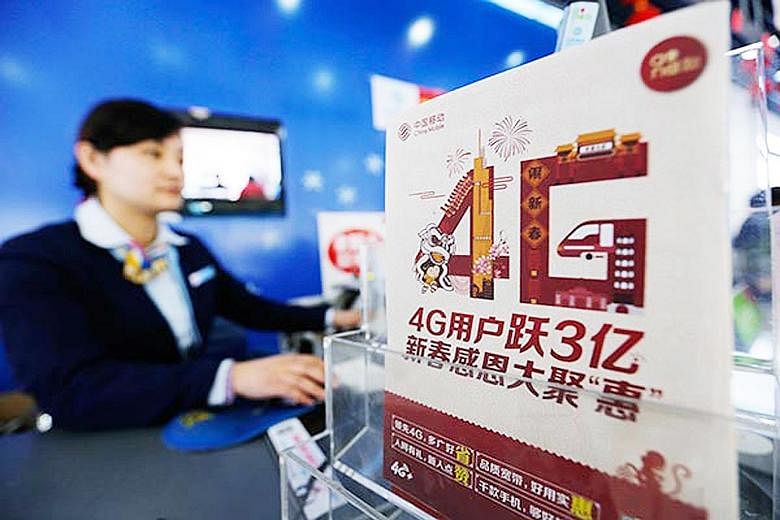At the end of each school day in rural Tongxin village, primary school teacher Chen Rong looks forward to spending some quality time before bed with her smartphone.
While the sleepy village in the mountainous Guangxi autonomous region that borders Vietnam seldom makes the news, 4G Internet service and her phone have helped her stay on top of developments both in and beyond China.
Her current media diet?
Listening to broadcasts on Voice of America, and watching TED Talks and the BBC.
"My English isn't very good but with the subtitles, I can understand what the outside world says about how China is changing, and read news that we don't frequently get here," said the 28-year-old.
She noted that topics such as terrorism and the rise of the Islamic State in Iraq and Syria (ISIS) are routinely under-reported in China.
"You can't get these broadcasts on the radio here; yet, with a phone, it's just a few taps away."
Self-edification is just one aspect of the relentless pace of China's 4G Internet roll-out. Together with affordable smartphones, it has done much to collapse space in the continent-size country and level the playing field between its first- tier cities and interior heartland.
Being able to go online easily has also meant that rural Chinese now have greater access to goods, and can communicate with faraway family members more easily.
The attendant growth in online shopping has also breathed new economic life into once-impoverished farms and villages.
The total number of 4G users in China reached 770 million last year, double the figure from a year earlier, data released by the Ministry of Industry and Information Technology on Feb 17 showed.
But the true importance of mobile connectivity was captured in a national survey. As of this year, more than 95 per cent of Chinese go online using their phones, compared to below 70 per cent five years back.
For Mr Zhang Xindeng, 34, a fertiliser seller from Songyuan city in Jilin province, fast and cheap mobile Internet access has changed his life.
Hopping onto e-commerce platform Taobao, he can buy whatever his big-city friends can, and get it delivered to him within days.
Social apps like WeChat and Kuaishou - think Chinese equivalents of WhatsApp and Instagram - allow him to stay in touch with family in Taipei and former colleagues in the United States for the cost of next to nothing. Even as he does more with his phone these days, his monthly phone bill is a fraction of what it was just a year ago: about 20 yuan (S$4), compared to 150 yuan.
The growing accessibility of the mobile Internet has also made Chinese e-wallet services such as Alipay and WeChat Pay immensely popular: Today, nearly 200 million people in China use their phones to pay for purchases both online and in physical stores.
This has been a boon for many Chinese who do not own credit cards, such as tour guide Shi Jun, 36.
Even in more remote places such as the Shenxiangzhen township in Anhui province where he is from, more restaurants and stores are accepting e-wallet payments, moving China closer to becoming a cashless society.
"I still remember carrying about 100,000 yuan to a car dealership four years ago to buy my car, as cash was king then," he said, no small feat given that the largest Chinese note is 100 yuan. "Now, that would be unnecessary and we have the Internet and these apps to thank."
As Internet penetration and e-commerce begin to plateau in the first- and second-tier cities, Chinese tech giants such as Alibaba are focusing more attention on townships and villages.
Alibaba chief executive Daniel Zhang has termed his company's continued expansion into rural China a "key battlefield".
Last year, it agreed to team up with the Communist Youth League, an arm of the Communist Party, to train one million teenagers in rural areas in e-commerce operations.
China is also aiming to make the world's largest 4G network even larger. It aims to add another two million 4G base stations in more rural areas by next year.
But amid the exuberance and undeniable benefits, greater Internet access has not come without the downsides.
Warranty and after-sales services for goods purchased online are still lacking, especially for shoppers in more far-flung places.
Mr Shi, the tour guide, had to throw out a kitchen exhaust hood he bought online as it started to fail after a few weeks, and the seller was uncontactable. "I still buy clothes and smaller household items on the Internet but, for appliances, I'd rather buy from the shop for better peace of mind," he said.
Ms Chen, the teacher, has also started to see the ills of Internet and phone addiction creeping into village life.
"Some of the students come to school bleary-eyed and can barely concentrate, and at break time, it is obvious what they were doing all night. All they talk about are mobile games," she lamented.
Many adults are also hooked on gambling apps such as Fight The Landlord, a popular poker card game in China now updated for smartphones.
"How can the adults control the children if they are playing too?" she said. "These phones have brought us many good things but there is the bad as well."

